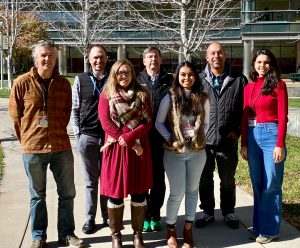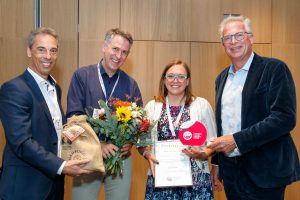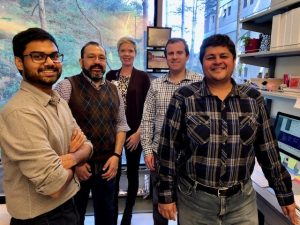Because of generous donor support, these eight clinical trials are helping kids with cancer right now:
- Newly diagnosed diffuse midline glioma
- Newly diagnosed or recurrent adamantinomatous craniopharyngioma
- Recurrent or progressive low- or high-grade glioma with BRAF mutation
- Relapsed posterior fossa ependymoma
- Infiltrative high- and low-grade glioma
- Recurrent ependymoma
- Group 3 and 4 medulloblastoma
- MYC-driven medulloblastoma
Additionally, here are a few more highlights from the labs this past year:
CAR-T cell therapy, a form of immunotherapy, is being expanded successfully into pediatric brain tumors, including DIPG and ependymoma.
Sujatha Venkataraman, PhD showed good results with a novel CAR-T cell that targets an antigen found on DIPG and Ewing Sarcoma tumor cells.
Drs. Rajeev Vibhakar, Eric Kohler, and Sujatha Venkataraman developed a CAR-T cell that targets two antigens present on the surface of DIPG cells. This CAR-T cell is effectively targeting and killing DIPG tumor cells in lab studies and should be a clinical trial in the next couple of years.

CAR therapy is also being applied in new ways for solid tumors.
Drs. Siddhartha Mitra, Sujatha Venkataraman, and Eric Kohler are working together to create CAR-engineered macrophages, also known as CAR-M cells. The team has shown that CAR-Ms will target and destroy specific cancer cells in solid tumors.

Spatial transcriptomics combined with single-cell RNA sequencing is an emerging technique of exploring the physical geography of cells within a tumor. Researchers in the Morgan Adams Foundation Pediatric Brain Tumor Research Program are pioneering the application of spatial transcriptomics to brain tumors.
Dr. Foreman’s lab made several important discoveries using spatial transcriptomics in 2022. An analysis of ependymoma identified three major subpopulations of immune cells that play a role in the progression of the tumor.
Additionally, two new clusters of medulloblastoma cell types were discovered that advance the understanding of the disease and how to treat it.

A first-of-its-kind atlas of single-cell RNA sequencing data for pediatric brain tumors was established in 2021. Two more tumor types were completed and spatial transcriptomics data for ependymoma was added in 2022. This atlas is open to the public and available to anyone in the research community. With both raw and analyzed data available, the atlas is especially useful for researchers who don’t have access to advanced bioinformatics capabilities.
Led by Andy Donson, current data in the atlas includes ependymoma and medulloblastoma, with both high-grade and low-grade glioma data being compiled now. Dozens of papers published in 2022 by researchers around the world cited the atlas data as a reference. Check it out at pneuroonccellatlas.org

The 20th International Symposium on Pediatric Neuro-Oncology (ISPNO) was held in Hamburg, Germany in June. It is the major global meeting for the international community of professionals involved in the scientific research, diagnosis, treatment, and rehabilitation of kids and teens with brain and central nervous system cancers. Doctors and researchers from the Morgan Adams Foundation Pediatric Brain Tumor Research Program had 39 abstracts selected for presentation. Of those, 11 were chosen for coveted and highly respected oral presentations during the three-day gathering, the most of any research group in the world.
Throughout the conference, work from the Morgan Adams Foundation Pediatric Brain Tumor Research was recognized as innovative and impactful in the search for safer and more effective pediatric neuro-oncology treatments. Senior Researcher Andrea Griesinger received the Pediatric Cancer Research Award for the highest-ranked abstract in the immunotherapy field.
 Dr. Amanda Winters is working to understand if leukemia stem cells (LSCs) play a role in pediatric acute myeloid leukemia relapse as they do in adults. She has identified four proteins on the surface of LSCs that may be viable targets.
Dr. Amanda Winters is working to understand if leukemia stem cells (LSCs) play a role in pediatric acute myeloid leukemia relapse as they do in adults. She has identified four proteins on the surface of LSCs that may be viable targets.
In addition, Dr. Kohler has begun developing a CAR-T cell based on the findings of this project.

Dr. David Solomon and his team have identified four new subtypes of pediatric cancer in the last two years, including:
- Sarcomas and brain tumors driven by rearrangements in a gene called BCOR
- CNS embryonal tumors with PLAGL1/2 gene amplification
- Intracranial mesenchymal tumors with FET-CREB fusions
- A new pediatric subtype of primary central nervous system lymphoma
- A new distinct subtype of astroblastoma, a type of glioma brain tumor
Advancements like those that are happening with Dr. Solomon’s research team have contributed to more precise methods of classifying and treating pediatric brain tumors. The combination of conventional histopathology (studying tumors under a microscope) with cutting-edge genomic profiling has become the standard of care for diagnosing neuro-oncology patients in the last few years. These efforts to accurately diagnose patients are the basis for “precision medicine” and providing treatment based on the most precise information available.
AND, on top of all these fantastic advances in the lab, 13 families received financial assistance to support them through the incredibly challenging work of caring for their child with cancer. Click here to read about families who have been helped through financial assistance

